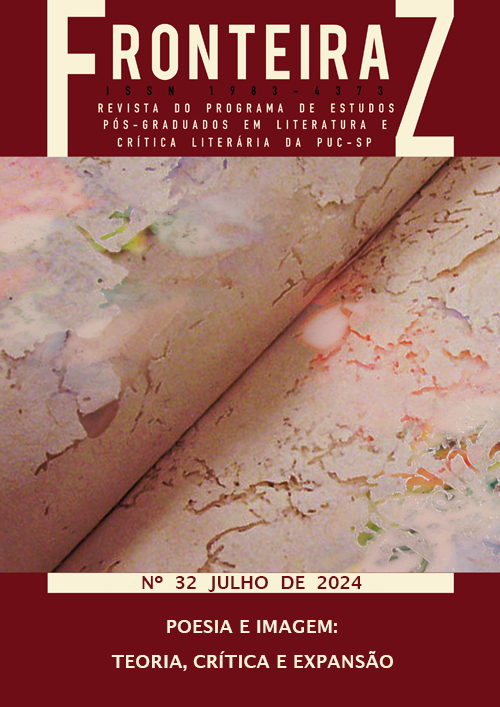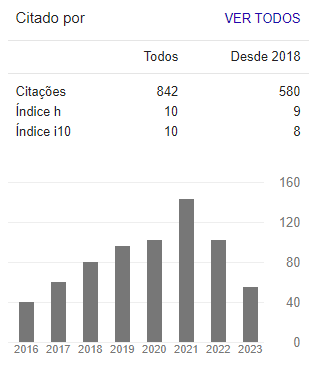Três poemas de Alice Dunbar-Nelson em português
tradução coletiva e a preservação da crítica literária sobre a escrita de mulheres negras
DOI:
https://doi.org/10.23925/1983-4373.2024i32p236-255Palavras-chave:
Tradução de poesia, Tradução coletiva, Escrita de autoria negra, Escritas da diáspora, InterseccionalidadeResumo
Neste artigo, são apresentados os poemas “I Sit and Sew” (1918), “You! Inez!” (1921) e “Violets” (1917), de autoria de Alice-Dunbar Nelson, vertidos para o português. Os textos são fruto de traduções coletivas, dialogadas e compartilhadas. Apresentamos aspectos biográficos de Dunbar-Nelson que são importantes para o estudo crítico de seus textos e para o objetivo de preservação da crítica literária produzida acerca da escrita de mulheres negras da diáspora (Hull, 1980; 1988). Observamos, ainda, o contexto de publicação e escrita dos poemas, discutindo a interpretação destes e os desafios enfrentados ao longo do processo tradutório. Discorremos sobre as teorias da tradução que embasam o trabalho aqui apresentado (Britto, 2012; 2017) e pensamos a tradução como um projeto de importância política, na medida em que amplia a possibilidade de leitura de autoras negras de língua inglesa no contexto brasileiro.
Referências
AGUIAR, A. C. de. O dodecassílabo iâmbico misto: uma proposta para a adaptação do verso branco épico inglês ao português. Belas Infiéis, v. 9, n. 1, p. 11-31, 2020. Disponível em: https://periodicos.unb.br/index.php/belasinfieis/article/download/26766/25070. Acesso em: 6 abr. 2024.
ATLAS, N. Alice Dunbar-Nelson, Harlem Renaissance writer. Literary ladies guide: an archive dedicated to classic women and their work. 2022. Disponível em: https://www.literaryladiesguide.com/author-biography/alice-dunbar-nelson/. Acesso em: 6 abr. 2024.
BRITTO, P. H. A tradução literária. Rio de Janeiro: Civilização Brasileira, 2012.
BRITTO, P. H. Para uma avaliação mais objetiva das traduções de poesia. Eutomia, v. 1, n. 20, p. 226-242, 2017. Disponível em: https://periodicos.ufpe.br/revistas/index.php/EUTOMIA/article/view/234813. Acesso em: 6 abr. 2024.
CRENSHAW, K. Demarginalizing the intersection of race and sex: a black feminist critique of antidiscrimination doctrine, feminist theory and antiracist politics. University of Chicago Legal Forum. v. 1989, n. 1. p. 139-167. Disponível em: https://chicagounbound.uchicago.edu/cgi/viewcontent.cgi?article=1052&context=uclf. Acesso em: 6 abr. 2024.
COMBAHEE RIVER COLLECTIVE. The Combahee River Collective Statement. In: SMITH, Barbara (ed.). Home girls: a black feminist anthology. New York: Kitchen Table Press, 1983. p. 272-281.
DUNBAR-NELSON, A. Violets and other tales. Originally published in 1895 (in the public domain). 72 p. Disponível em: https://louisiana-anthology.org/texts/dunbar/dunbar--violets.html. Acesso em: 6 abr. 2024.
DUNBAR-NELSON, A. Letter from Alice Dunbar-Nelson to W. E. B. Du Bois, June 9, 1931. W. E. B. Du Bois Papers (MS 312). Special Collections and University Archives, University of Massachusetts Amherst Libraries. Disponível em: https://credo.library.umass.edu/view/full/mums312-b060-i129. Acesso em: 6 abr. 2024.
EVARISTO, C. Da grafia-desenho de minha mãe, um dos lugares de nascimento da minha escrita. In: ALEXANDRE, M. A. (org.). Representações performáticas brasileiras: teorias, práticas e suas interfaces. Belo Horizonte: Mazza Edições, 2007. p 16-21. Disponível em: http://revistazcultural.pacc.ufrj.br/wp-content/uploads/2020/10/DA-GRAFIA-DESENHO-DE-MINHA-M%C3%83E-UM-DOS-LUGARES-DE-NASCIMENTO-DE-MINHA-ESCRITA-%E2%80%93-Revista-Z-Cultural.pdf. Acesso em: 6 abr. 2024.
HALLET, J. P. Sappho and her social context: sense and sensuality. Signs. v. 4. n. 3. 1979. Disponível em: https://www.jstor.org/stable/3173393. Acesso em: 6 abr. 2024.
HASTINGS, C. How lavender became a symbol of LGBTQ resistance. CNN. 2020. Disponível em: https://edition.cnn.com/style/article/lgbtq-lavender-symbolism-pride/index.html. Acesso em: 6 abr. 2024.
HOOKS, b. Black women and feminism. In: HOOKS, b. Ain’t I a woman: Black women and feminism. New York: Routledge, 2015.
HOOKS, b. Black women intellectuals. In: HOOKS, b.; WEST, C. Breaking bread: insurgent black intellectual life. Boston: South End Press, 1991. p. 147-165.
HULL, G. T. Alice Dunbar-Nelson: a personal and literary perspective. Feminist Studies. v. 6, n. 2, 1980. p. 314-320. Disponível em https://philpapers.org/rec/HULRAD. Acesso em: 6 abr. 2024.
HULL, G. T. (ed.). The works of Alice Dunbar-Nelson. New York: Oxford University Press, 1988. Disponível em: https://books.google.com.br/books?id=W3EtA7Y8cfUC&printsec=frontcover&hl=pt-BR&source=gbs_ge_summary_r&cad=0#v=onepage&q&f=false. Acesso em: 6 abr. 2024.
LORDE, A. A poeta como professora – a humana como poeta – a professora como humana. In: RIBEIRO, D. (org.). LORDE, A. Sou sua irmã: escritos reunidos. Trad. Stephanie Borges. São Paulo: Ubu Editora, 2020. p. 103-105.
LORDE, A. Idade, raça, classe e sexo: as mulheres redefinem a diferença. In: LORDE, A. Irmã outsider. Trad. Stephanie Borges. Belo Horizonte: Autêntica, 2021. p. 141-154.
MARTINS, L. M. Performances do tempo espiralar. Rio de Janeiro: Editora Cobogó, 2021.
MARTINS, N. S. Introdução à estilística. 4. ed. rev. São Paulo: EDUSP, 2012.
OLIVER, M. Imagery. In: OLIVER, M. A poetry handbook: a prose guide to understanding and writing poetry. Boston: Mariner Books, 1994.
REARICK, Z. The sonnet in twentieth-century America. 2018. Tese (Doutorado) – Department of English, Georgia State University, Atlanta, 2018. Disponível em: https://scholarworks.gsu.edu/english_diss/195/. Acesso em: 6 abr. 2024.
WALKER, A. Womanist. In: WALKER, A. In search of our mothers’ gardens: womanist prose. Essex: Phoenix, 1983. p. 11-12.
Downloads
Publicado
Como Citar
Edição
Seção
Licença
Copyright (c) 2024 FronteiraZ. Revista do Programa de Estudos Pós-Graduados em Literatura e Crítica Literária

Este trabalho está licenciado sob uma licença Creative Commons Attribution-NonCommercial 4.0 International License.







 Este obra está licenciada com uma Licença
Este obra está licenciada com uma Licença 